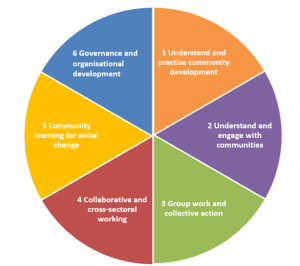Community Development NOS
Community Development is an approach to achieving social change. It is action taken through building organisation, learning and power within communities in order to promote democracy, sustainable development, equality and social justice. It builds community capacity and influence by enabling people to develop the confidence, understanding and skills required to influence decision making and service delivery.
The National Occupational Standards outline clearly the skills, values and processes required for effective and appropriate community development practice. Community development is undertaken by a wide range of people in different settings and roles. Community development practitioners may be paid (employed workers) or unpaid (community activists and voluntary workers), and all need to be competent in the necessary skills and knowledge and to work with integrity to support communities who may have few recognised resources and limited access to decision makers.
The Standards applied to practice will ensure that community development impacts on poverty, racism and social exclusion in a way that empowers, enables and encourages participation.
The summary of the NOS describes their role and purpose. It sets out key values, key areas and standards that relate to these, emphasising the role of the reflective practitioner.
Downloads
Functional Areas
KEY PURPOSE:
Community development enables people to work collectively together in a structured and co-ordinated way to bring about positive social change to achieve equality, social justice, climate justice and human rights. It is underpinned by a clear set of values and ethical principles.
This long-term process starts with people’s own experience and enables communities* to work together to:
- identify the needs and actions they wish to address
- plan and take collective action
- build on and strengthen their confidence, skills and knowledge
- challenge unequal power relationships
- promote social justice, equality and participation
- in order to improve the quality of their own lives, the communities in which they live and societies of which they are a part.
*Communities refer to those that can be defined by geography, identity or interest.

